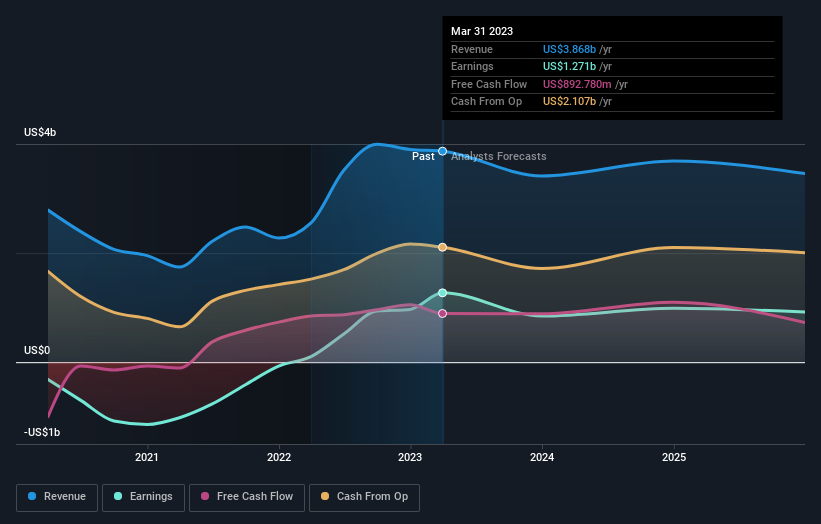After losing 2.2% in the past year, Murphy Oil Corporation (NYSE:MUR) institutional owners must be relieved by the recent gain
Key Insights
Given the large stake in the stock by institutions, Murphy Oil's stock price might be vulnerable to their trading decisions
A total of 14 investors have a majority stake in the company with 51% ownership
A look at the shareholders of Murphy Oil Corporation (NYSE:MUR) can tell us which group is most powerful. And the group that holds the biggest piece of the pie are institutions with 78% ownership. Put another way, the group faces the maximum upside potential (or downside risk).
After a year of 2.2% losses, last week’s 3.7% gain would be welcomed by institutional investors as a likely sign that returns might start trending higher.
Let's delve deeper into each type of owner of Murphy Oil, beginning with the chart below.
See our latest analysis for Murphy Oil
What Does The Institutional Ownership Tell Us About Murphy Oil?
Institutions typically measure themselves against a benchmark when reporting to their own investors, so they often become more enthusiastic about a stock once it's included in a major index. We would expect most companies to have some institutions on the register, especially if they are growing.
Murphy Oil already has institutions on the share registry. Indeed, they own a respectable stake in the company. This suggests some credibility amongst professional investors. But we can't rely on that fact alone since institutions make bad investments sometimes, just like everyone does. When multiple institutions own a stock, there's always a risk that they are in a 'crowded trade'. When such a trade goes wrong, multiple parties may compete to sell stock fast. This risk is higher in a company without a history of growth. You can see Murphy Oil's historic earnings and revenue below, but keep in mind there's always more to the story.
Since institutional investors own more than half the issued stock, the board will likely have to pay attention to their preferences. Hedge funds don't have many shares in Murphy Oil. BlackRock, Inc. is currently the largest shareholder, with 12% of shares outstanding. For context, the second largest shareholder holds about 11% of the shares outstanding, followed by an ownership of 4.8% by the third-largest shareholder. Additionally, the company's CEO Roger Jenkins directly holds 0.5% of the total shares outstanding.
Looking at the shareholder registry, we can see that 51% of the ownership is controlled by the top 14 shareholders, meaning that no single shareholder has a majority interest in the ownership.
While it makes sense to study institutional ownership data for a company, it also makes sense to study analyst sentiments to know which way the wind is blowing. Quite a few analysts cover the stock, so you could look into forecast growth quite easily.
Insider Ownership Of Murphy Oil
The definition of an insider can differ slightly between different countries, but members of the board of directors always count. The company management answer to the board and the latter should represent the interests of shareholders. Notably, sometimes top-level managers are on the board themselves.
I generally consider insider ownership to be a good thing. However, on some occasions it makes it more difficult for other shareholders to hold the board accountable for decisions.
We can report that insiders do own shares in Murphy Oil Corporation. This is a big company, so it is good to see this level of alignment. Insiders own US$299m worth of shares (at current prices). It is good to see this level of investment by insiders. You can check here to see if those insiders have been buying recently.
General Public Ownership
The general public-- including retail investors -- own 17% stake in the company, and hence can't easily be ignored. While this group can't necessarily call the shots, it can certainly have a real influence on how the company is run.
Next Steps:
It's always worth thinking about the different groups who own shares in a company. But to understand Murphy Oil better, we need to consider many other factors. Like risks, for instance. Every company has them, and we've spotted 3 warning signs for Murphy Oil (of which 1 makes us a bit uncomfortable!) you should know about.
If you would prefer discover what analysts are predicting in terms of future growth, do not miss this free report on analyst forecasts.
NB: Figures in this article are calculated using data from the last twelve months, which refer to the 12-month period ending on the last date of the month the financial statement is dated. This may not be consistent with full year annual report figures.
Have feedback on this article? Concerned about the content? Get in touch with us directly. Alternatively, email editorial-team (at) simplywallst.com.
This article by Simply Wall St is general in nature. We provide commentary based on historical data and analyst forecasts only using an unbiased methodology and our articles are not intended to be financial advice. It does not constitute a recommendation to buy or sell any stock, and does not take account of your objectives, or your financial situation. We aim to bring you long-term focused analysis driven by fundamental data. Note that our analysis may not factor in the latest price-sensitive company announcements or qualitative material. Simply Wall St has no position in any stocks mentioned.
Join A Paid User Research Session
You’ll receive a US$30 Amazon Gift card for 1 hour of your time while helping us build better investing tools for the individual investors like yourself. Sign up here

 Yahoo Finance
Yahoo Finance 

